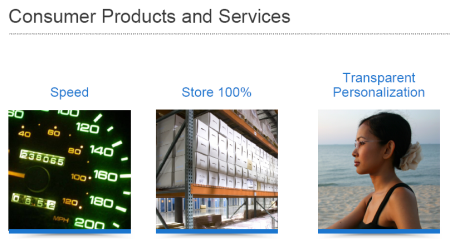The Google Analyst Day
presentation makes for interesting reading. Thanks to Greg
Linden for providing the early analysis and text from the now withdrawn powerpoint
presentation (only available now as a 10MB PDF – sans the
ppt notes unfortunately). Greg provided the notes to slide 19, which are fascinating for those of us interested in the Web Office and living 100% on the Web. Some
would say my head is already in the clouds, but it seems Google is thinking
along the same lines. Check these notes out (and also note the references to GDrive and
competing with Microsoft):

“Theme 2: Store 100% of User Data
With infinite storage, we can house all user files, including: emails, web history,
pictures, bookmarks, etc and make it accessible from anywhere (any device, any platform,
etc).
We already have efforts in this direction in terms of GDrive, GDS, Lighthouse, but all of
them face bandwidth and storage constraints today. For example: Firefox team is working
on server side stored state but they want to store only URLs rather than complete web
pages for storage reasons. This theme will help us make the client less important
(thin client, thick server model) which suits our strength vis-a-vis Microsoft and is
also of great value to the user.
As we move toward the “Store 100%” reality, the online copy of your data will become
your Golden Copy and your local-machine copy serves more like a cache. An important
implication of this theme is that we can make your online copy more secure than it would
be on your own machine.
Another important implication of this theme is that storing 100% of a user’s data
makes each piece of data more valuable because it can be access across applications.
For example: a user’s Orkut profile has more value when it’s accessible from Gmail (as
addressbook), Lighthouse (as access list), etc.”
(emphasis mine)
Interesting that these notes point to security as being one of the main
benefits of Web storage. In Web Office discussions so far, security is typically
seen as being a potential weakness. Another point worth highlighting is the cross-device
implications of online data, which has been recognized as one of the main benefits of a
web-based office – together with collaboration capabilities.
This all revives my faith in Google (not that I ever doubted they were up to
something) and it should make Microsoft sit up and take notice. I’d love to get more
details of their Store 100% developments… I’ll see if I can collect more data.
btw the term “golden copy” seems to derive from data/records management. The best
definition I found was this:
“Question: What is a golden copy?
Answer: The ‘golden copy’ is the official, master version of a
record. There can only be one golden copy of each record. A golden copy exists from
the point of creation of a record not just once the record is no longer used. It is
important to remember that the golden copy of a record exists for all stages of its
development. Therefore during the early stages of a records development the golden copy
may be a draft. When a record is superseded by an updated version a golden copy may still
exist for the previous version, for example with assessment regulations which are updated
every year, it is not just the current regulations which have a golden copy – a
golden copy should exist for each previous set of regulations, and there will also be a
golden copy of the draft of the next year’s regulations.”





























